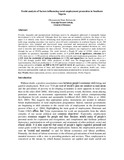Please use this identifier to cite or link to this item:
http://hdl.handle.net/10311/1316Full metadata record
| DC Field | Value | Language |
|---|---|---|
| dc.contributor.author | Kolawole, Oluwatoyin D. | - |
| dc.date.accessioned | 2014-12-11T12:50:38Z | - |
| dc.date.available | 2014-12-11T12:50:38Z | - |
| dc.date.issued | 2012 | - |
| dc.identifier.citation | Kolalwole, Oluwatoyin D. (2012) Probit analysis of rural employment promotion in southern Nigeria, World Journal of Entrepreneurship, Management and Sustainable Development Vol. 8, No.4, pp.273-285 | en_US |
| dc.identifier.issn | 2042-5961 | - |
| dc.identifier.uri | http://hdl.handle.net/10311/1316 | - |
| dc.description | The attached article is a pre-print. The final article is published by Emerald Insight in the journal World Journal of Entrepreneurship, Management and Sustainable Development and it is to be cited as follows: Oluwatoyin Dare Kolawole, (2012) "Probit analysis of factors influencing rural employment promotion in southern Nigeria", World Journal of Entrepreneurship, Management and Sustainable Development, Vol. 8 Iss: 4, pp.273 - 285 available at the following link: http://www.emeraldinsight.com/doi/abs/10.1108/20425961211276642 | en_US |
| dc.description.abstract | Poverty, inequality and unemployment challenges need to be adequately addressed if sustainable human development is to be achieved. Although, these key issues are not mutually exclusive, the thrust of this paper is to identify some factors influencing rural employment promotion (REP) in southern Nigeria. A multi-stage sampling procedure was used to select 60 rural communities in southern Nigeria. In all, 300 interviewees were sampled and interviewed using structured and unstructured interview schedules. Descriptive statistical techniques such as frequency, percentages, mean and standard deviation, etc. were used to describe and summarise the data collected. Probit analysis was employed to make deductions through the use of STATA package. The result showed a Pseudo R2 value of 0.3581, which is quite reasonable for qualitative dependent variable models. At P ≤ 0.01 level of significance, education (z = 2.02), farm size (z = 2.39) positively influenced the drive towards rural employment generation. Also, at P ≤ 0.01 level, the availability of banking institutions (z = 1.94) and support from the family members (z = 2.17) did strongly predict REP. Other predictors of REP were the disaggregated units of project type/orientation, which are production (z = 1.67) and service-oriented ventures (z = 1.98) and they both had strong and positive influence on REP at P≤ 0.05 and 0.01 levels of significance, respectively. The paper concludes that the provision of basic and functional services such as education, health care, water, electricity and motorable roads are vital for rural employment promotion drive in rural communities. | en_US |
| dc.description.sponsorship | The Idachaba Foundation for Research and Scholarship (IFRES) in Ibadan, Nigeria | en_US |
| dc.language.iso | en | en_US |
| dc.publisher | Emerald Insight, http://www.emeraldinsight.com | en_US |
| dc.subject | Rural employment | en_US |
| dc.subject | Poverty | en_US |
| dc.subject | Socio-economic | en_US |
| dc.subject | Infrastructure | en_US |
| dc.subject | Probit | en_US |
| dc.subject | Nigeria | en_US |
| dc.title | Probit analysis of factors influencing rural employment promotion in southern Nigeria | en_US |
| dc.type | Preprint | en_US |
| dc.rights.holder | Emerald Insight | en_US |
| dc.link | http://www.emeraldinsight.com/doi/abs/10.1108/20425961211276642 | en_US |
| Appears in Collections: | Research articles (ORI) | |
Files in This Item:
| File | Description | Size | Format | |
|---|---|---|---|---|
| Probit analysis of rural employment KOLAWOLE.pdf | Main article | 405.73 kB | Adobe PDF |  View/Open |
Items in DSpace are protected by copyright, with all rights reserved, unless otherwise indicated.
